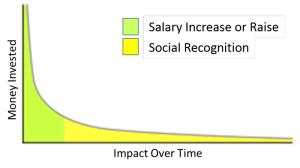One statement sure to raise my ire when discussing the Power of Thanks in the workplace is: “They get paid to do their job. That’s recognition enough.”
It’s a patently false statement. Pay and recognition serve very different needs, but they are in a symbiotic relationship when it comes to fulfilling those employee needs.
All the recognition in the world won’t help resolve an underpaid employee’s base needs in terms of Maslow’s Hierarchy. And pay raises, consistently and appropriately given, won’t meet the higher-order employee needs, either.
A correlation between pay and longevity
But used together in a balanced way, compensation and recognition achieve goals for employee satisfaction, engagement, productivity, performance and retention.
I tend to think of the two in balance as represented in the graph below. Pay increases represents the green area – more money invested, but with a shorter-term impact. Strategic recognition, represented in the yellow area, requires less monetary investment, but has a much longer and lasting impact.
Ben Eubanks recently shared some observations from a Freakonomics episode on behavioral science (quoting):
- There is some correlation of pay vs longevity: Pay enables people to stay longer. Data shows that a 10 percent increase in pay delivers a 5 percent decrease in quitting behavior.
- You know that “warm fuzzy” feeling someone gets from a raise? Research shows that feeling only lasts 1-4 weeks.
- Wages are a lever you can use to drive behaviors, but other things keep your turnover low, and are less costly. For instance, finding better supervisor fit is a great opportunity.
- But seriously, how important is a supervisor in the employment relationship? The supervisor accounts for about as much reason someone will stay as all other factors (culture, job, wages, etc.) combined. Huge.
What employees feel organizations value
Compare that to recent findings from the American Psychological Association (APA). The APA recently recognized six organizations for healthy workplace practices, identifying five (5) factors that employees say their organizations value most:
- Healthy lifestyle/well-being — 92 percent;
- Employee recognition — 91 percent;
- Training and development — 91 percent;
- Work-life balance — 86 percent;
- Employee involvement — 84 percent.
Employees need praise AND compensation
The result in terms of retention is profound with the turnover rate in these organizations half the national average with only 8% of employees saying they intend to look for a new position in the next year.
David W. Ballard, PsyD, MBA, head of APA’s Center for Organizational Excellence, had this to say:
Creating a psychologically healthy workplace can have a big impact. Not only do employees feel valued and heard, they’re also more likely to participate in health and wellness offerings, share the organization’s values, have higher levels of job satisfaction and say they are more motivated to give it their all.”
Psychologically healthy employees require appropriate compensation and praise for their efforts. Are the two in balance in your organization?
This was originally published at the Compensation Café blog, where you can find a daily dose of caffeinated conversation on everything compensation.
